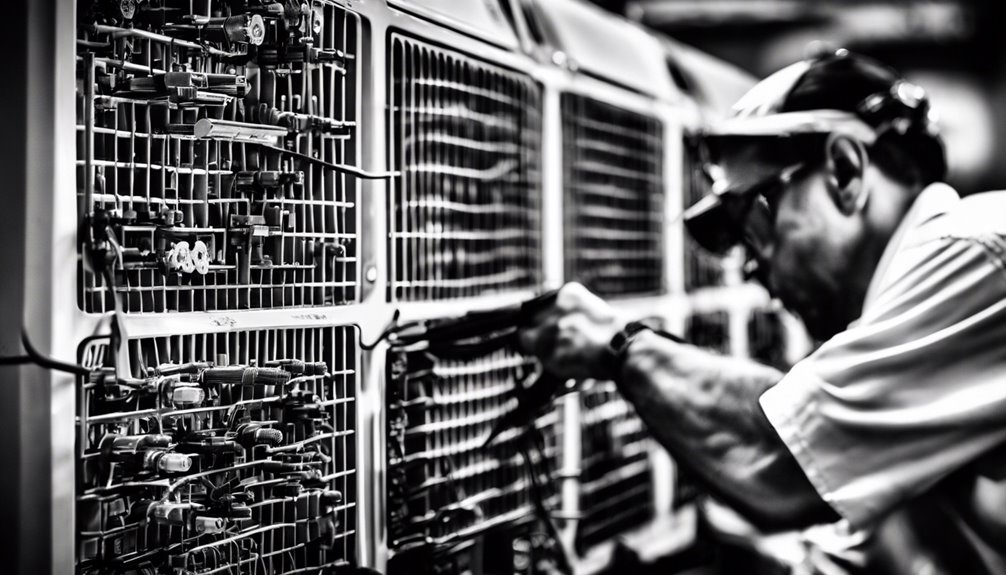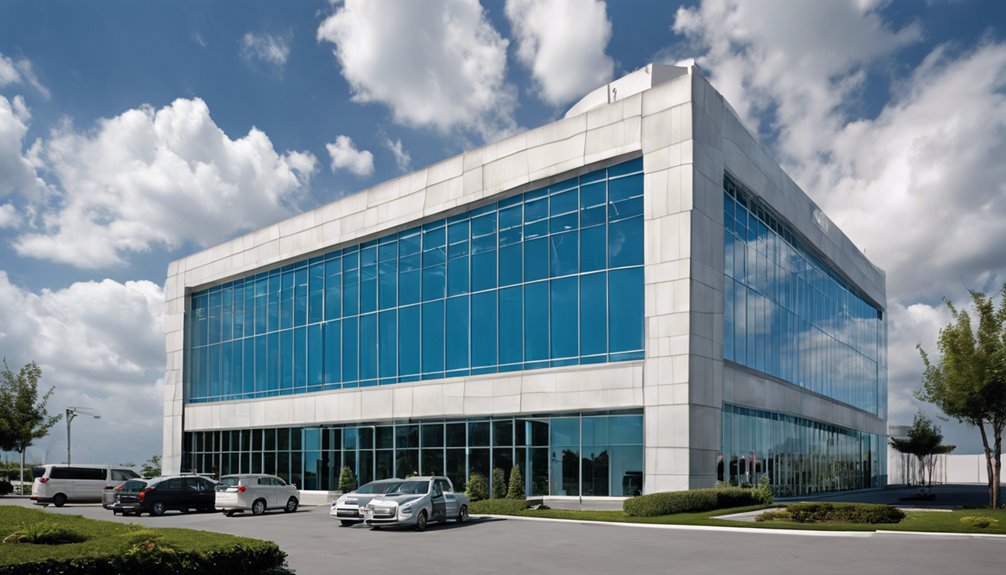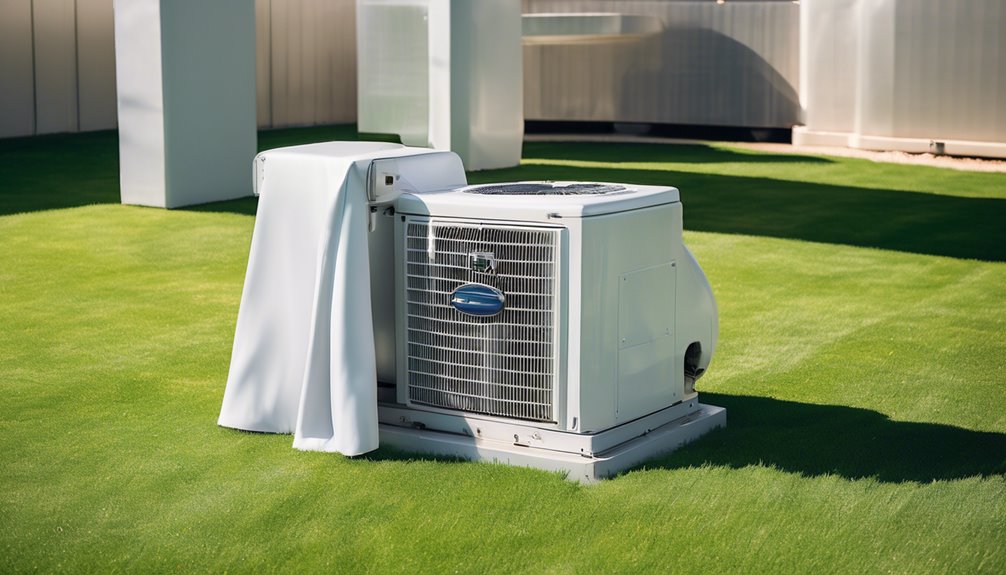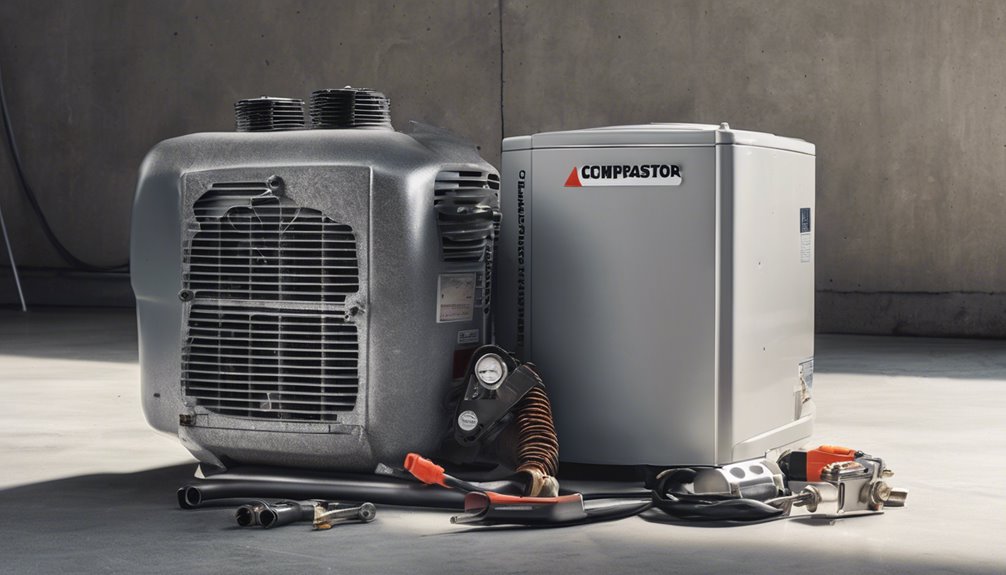Regular AC maintenance is essential to ensure your air conditioner operates efficiently, effectively, and safely throughout the hot summer months. You'll want to schedule tune-ups, clean or replace filters, and maintain coils to improve air quality and reduce energy bills. Refrigerant leaks need to be detected and repaired, while thermostat calibration and upgrades can optimize energy efficiency. Don't forget to inspect and seal ductwork, clean condenser coils, and lubricate the fan motor. By following these steps, you'll be well on your way to a smooth-running AC, and learning more about each task will ensure your system runs at its best.
Key Takeaways
- Regular AC maintenance includes scheduling tune-ups every 3-6 months to ensure efficient operation and prevent costly repairs.
- Filter cleaning and replacement every 1-3 months improves air quality, maintains filter efficiency, and saves energy.
- Coil maintenance involves removing dust and debris to ensure proper airflow and heat transfer, and extending system lifespan.
- Refrigerant and thermostat maintenance involve detecting leaks, recharging refrigerant, and calibrating thermostats for optimal energy efficiency.
- Ductwork and electrical connection maintenance involve inspecting and sealing ducts, and inspecting and tightening electrical connections to prevent faults.
Scheduling Regular Tune-Ups
Scheduling regular tune-ups is crucial to ensure your AC unit operates efficiently and effectively throughout the hot summer months.
By doing so, you'll avoid costly repairs, reduce energy bills, and prolong the lifespan of your AC unit. Set seasonal reminders to schedule tune-ups before the peak summer season to ensure your unit is running smoothly.
The maintenance frequency will depend on your AC unit's age, usage, and manufacturer's recommendations. Typically, it's recommended to have your AC unit serviced every 3-6 months.
Sticking to a regular maintenance schedule will help identify and address potential issues before they become major problems, saving you time, money, and stress in the long run.
Filter Cleaning and Replacement
Your air conditioner's filter is its first line of defense against dust, dirt, and other airborne particles that can compromise its performance and air quality.
When you neglect filter cleaning and replacement, your AC has to work harder, leading to increased energy bills and reduced filter efficiency. Dirty filters can also contaminate the air you breathe, aggravating respiratory issues like asthma.
By cleaning or replacing your filter every 1-3 months, you'll improve air quality and maintain your AC's filter efficiency. This simple task can save you money, extend your AC's lifespan, and ensure a healthier indoor environment.
Make filter cleaning and replacement a priority to breathe easy and stay cool!
Coil Maintenance and Cleaning
When you neglect coil maintenance, your AC system's efficiency and performance suffer.
You'll want to remove dust and debris from the coils to ensure proper airflow and heat transfer. By doing so, you'll prevent increased energy bills and system breakdowns, and keep your AC running smoothly.
Coil Dust Removal
Dust buildup on your air conditioning coils can significantly impede the system's performance, leading to increased energy bills and reduced airflow. As dust accumulates, it blocks airflow, forcing your AC to work harder and consume more energy. Regular coil dust removal is essential to maintain your system's efficiency.
| Coil Condition | Effects on System | Recommended Action |
|---|---|---|
| Light dusting | Slightly reduced airflow | Vacuum or brush off coils |
| Moderate dust | Increased energy consumption | Use a garden hose to gently wash coils |
| Heavy dust | Reduced airflow, frozen coils | Use a coil cleaning brush or seek professional help |
| Dirty coils with debris | System failure, health risks | Seek professional cleaning and maintenance |
| Clean coils | Optimal airflow, energy efficiency | Schedule regular maintenance checks |
Debris Clearance Importance
Debris clearance is a critical aspect of coil maintenance and cleaning, as it can greatly impact the overall performance of your air conditioning system.
When you don't clear debris, it can create airflow obstacles that reduce your AC's efficiency. Leaves, twigs, and other yard landscaping materials can accumulate on your outdoor unit's coils, blocking airflow and causing your system to work harder.
This can lead to increased energy bills, reduced airflow, and even premature system failure. By regularly clearing debris from your coils, you can ensure optimal airflow, reduce energy consumption, and extend the lifespan of your air conditioning system.
Make it a habit to inspect and clean your coils every few months to keep your AC running smoothly and efficiently.
Refrigerant Leaks and Recharging
Because your air conditioner's refrigerant plays a crucial role in cooling your home, even a small leak can have a significant impact on its performance. A refrigerant leak can cause your AC to work harder, increasing energy bills and reducing its lifespan. To detect leaks, you'll need to use refrigerant detection methods such as electronic leak detectors or dye detection kits.
| Refrigerant Safety Protocols | Description |
|---|---|
| Wear protective gear | Gloves, goggles, and masks protect you from refrigerant exposure |
| Ensure proper ventilation | Open windows and doors to prevent refrigerant buildup |
| Handle refrigerant with care | Avoid spilling or dropping refrigerant containers |
| Follow manufacturer instructions | Adhere to guidelines for refrigerant handling and disposal |
A professional technician will recharge your AC with the correct type and amount of refrigerant after repairing the leak.
Thermostat Calibration and Upgrades
You rely on your thermostat to regulate your home's temperature, but if it's not calibrated correctly, you mightn't be getting accurate temperature readings.
Upgrading to a smart thermostat can integrate with your AC system to optimize energy efficiency. By calibrating and upgrading your thermostat, you can enjoy precise temperature control and a potential boost in energy efficiency.
Accurate Temperature Readings
The heart of any air conditioning system is the thermostat, responsible for regulating the temperature and ensuring your home remains comfortable.
However, if your thermostat's sensor isn't calibrated accurately, you may experience temperature fluctuations that can lead to discomfort and increased energy bills.
As part of regular AC maintenance, you should have your thermostat's sensor calibrated to ensure it's providing accurate temperature readings.
This involves adjusting the sensor to match the actual temperature, which helps your AC system to maintain a consistent temperature and prevent overheating or overcooling.
Smart Thermostat Integration
Upgrading to a smart thermostat can revolutionize your home's comfort and energy efficiency.
By integrating a smart thermostat into your AC system, you'll gain wireless connectivity and seamless control over your home's temperature. This means you can adjust the temperature remotely using your smartphone, ensuring your home is comfortable when you need it to be.
A smart thermostat also learns your schedule and preferences, optimizing your heating and cooling usage to create a truly smart home.
During regular AC maintenance, your technician will ensure your smart thermostat is calibrated correctly, providing you with accurate temperature readings and maximizing its potential.
Energy Efficiency Boost
As your smart thermostat learns your schedule and preferences, it's vital to ensure it's accurately calibrated to maximize energy efficiency. A well-calibrated thermostat can save you money on your energy bills and reduce your carbon footprint. Consider upgrading to a smart thermostat with advanced features like geofencing and energy audits. These features can help you identify areas of energy inefficiency and provide a cost analysis to help you make informed decisions.
| Feature | Benefit |
|---|---|
| Geofencing | Automatically adjusts temperature when you're away |
| Energy Audits | Identifies areas of energy inefficiency |
| Cost Analysis | Provides detailed breakdown of energy costs |
| Smart Scheduling | Optimizes temperature based on your schedule |
| Remote Access | Allows you to control your thermostat from anywhere |
Ductwork Inspection and Sealing
While you're enjoying the comfort of your air-conditioned space, it's easy to overlook the complex network of ducts behind the scenes.
However, neglecting ductwork inspection and sealing can lead to significant energy losses and compromised indoor air quality.
During maintenance, a technician will assess your ductwork design, identifying areas where airflow is restricted or compromised.
An airflow analysis will help pinpoint leaks, cracks, or gaps that need sealing.
By sealing these openings, you'll improve system efficiency, reduce energy bills, and breathe easier knowing your air is cleaner.
Don't let hidden ductwork issues sabotage your AC's performance – prioritize regular inspections and sealing to keep your system running smoothly.
Condenser Coil Cleaning and Debris Removal
Now that your ductwork is optimized, it's time to focus on another critical component of your AC system.
The condenser coils are responsible for dissipating heat, but they can't do their job efficiently if they're clogged with debris. Outdoor hazards like leaves, twigs, and dirt can accumulate on the coils, reducing airflow and increasing energy bills.
To clean the coils, you'll need to ensure coil accessibility. This might involve trimming nearby bushes or removing protective covers. Use a garden hose to gently spray the coils, working from the top down to avoid pushing debris further into the unit.
A soft-bristled brush can help dislodge stubborn debris. By keeping your condenser coils clean, you'll improve your AC's performance and reduce the risk of breakdowns.
Fan Motor Maintenance and Lubrication
Your AC's fan motor plays a vital role in circulating air and dissipating heat.
It's essential to maintain it properly to ensure your AC runs efficiently. You'll need to lubricate the motor bearings regularly to prevent overheating and wear.
Check your AC's manual to find out the recommended lubricant type, as some motors require specific types. You may need to use oil, grease, or a specialized lubricant.
Apply the lubricant according to the manufacturer's instructions to keep the motor running smoothly. Remember to wipe off any excess lubricant to prevent it from attracting dirt and dust.
Electrical Connection Inspection and Tightening
Proper fan motor maintenance sets the stage for a well-functioning AC system.
However, it's equally important to inspect and tighten electrical connections to prevent connection issues and electrical faults.
You'll want to ensure that all connections are secure and not loose, as loose connections can cause electrical faults, leading to system failures or even fires.
- Check for signs of wear, rust, or corrosion on connections and terminals.
- Verify that all connections are tightened to the manufacturer's recommended torque specifications.
- Look for any signs of overheating, such as melted insulation or burn marks, which can indicate electrical faults.
Frequently Asked Questions
Can I Perform AC Maintenance Myself or Do I Need a Professional?
You can try DIY AC maintenance, but be aware of its limitations, like complex repairs and safety risks. It's often better to hire a pro, who can provide expert benefits like efficient solutions, warranty maintenance, and peace of mind.
How Often Should I Inspect and Clean My Ac's Drain Line?
You should inspect and clean your AC's drain line every 3-6 months to prevent condensate overflow risks; follow drain cleaning tips like using a vacuum or wet/dry shop vac to suck out debris and ensure proper airflow.
What Are the Signs of an Oversized or Undersized Air Conditioner?
You'll know your air conditioner is oversized or undersized if you notice system mismatch issues, like frequent on/off cycles, uneven cooling, or humidity problems, which can lead to capacity issues and increased energy bills.
Can Regular AC Maintenance Reduce My Energy Bills?
You'll be glad to know that regular AC maintenance can indeed reduce your energy bills by optimizing your system's performance, leading to significant cost savings and improved energy efficiency, which translates to more money in your pocket!
Do I Need to Replace My AC if It's Still Working Fine?
If your AC is still working fine, you're lucky, but don't get too comfortable; age factors can secretly decrease system efficiency, and soon you'll be sweating – and overspending – again, so consider replacement before it's too late.
Conclusion
You've made the smart decision to prioritize regular AC maintenance. By staying on top of these tasks, you'll keep your system running efficiently, reduce energy bills, and prevent costly repairs down the line. Your AC will thank you, and so will your wallet. Remember, a well-maintained AC is a happy AC – and a happy AC means a comfortable, stress-free you!



